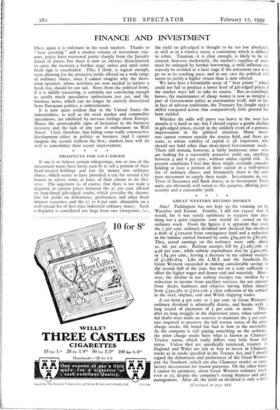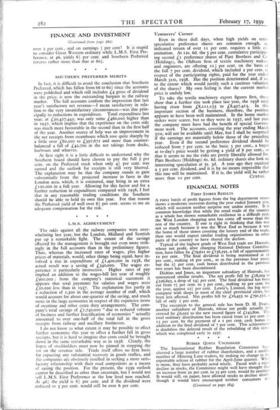GREAT WESTERN RECORD BROKEN
Alas! Paddington has not kept up the running set by Waterloo and Euston. Frankly, I did not expect that it would, for it was surely optimistic to suppose that any- thing but a quite exiguous sum would be earned on the ordinary stock. From the figures it is apparent that even the 4 per cent. ordinary dividend now declared has involved a draft of £roo,000 from contingency fund and a reduction in the balance carried forward by some £64,500 to £87,085. Thus, actual earnings on the ordinary were only about 2s. 6d. per cent. Railway receipts fell by £1,281,706, or 4.56 per cent., while railway expenditure rose by £400,168, or 1.84 per cent., leaving a decrease in net railway receipts of £1,681,874. Like the L.M.S. and the Southern, the Great Western succeeded in making considerable savings in the second half of the year, but not on a scale sufficient to offset the higher wages and dearer coal and materials. More- over, the decline in net railway receipts was swollen by a reduction in income from ancillary services, the net amount from docks, harbours and wharves having fallen sharply from £342,382 to £202,128, a clear reflection of the setback in the steel, tinplate, coal and Welsh shipping trades.
A cut from 4 per cent. to 2 per cent. in Great Western's ordinary dividend is admittedly drastic, and breaks with a long record of payments of 3 per cent. or more. Thus, after its long struggle in the depression years, when substan- tial drafts were made on reserves to maintain the 3 per cent. rate required to preserve the full trustee status of the prior charge stocks, the board has had to bow to the inevitable. As the company is still paying something on the ordinary. the prior charge stocks have what is known as Chancery Trustee status, which really differs very little from full status. Unless they are specifically restricted, trustees in England and Wales are just as free to invest in Chancery stocks as in stocks specified in the Trustee Act, and I should regard the debentures and preferences of the Great Western and the Southern (which are also Chancery stocks) as satis- factory investments for trustee purposes. On the other hand. I cannot be optimistic about Great Western ordinary stock. even at 23, despite the company's strong finances and alert management. After all, the yield on dividend is only a little
(Continued on page 282)
FINANCE AND INVESTMENT (Continued front page 280) over 2 per cent., and on earnings 4 per cent! It is stupid to consider Great Western ordinary while L.M.S. First Pre- ference, at 46, yields 81 per cent. and Southern Preferred returns rather more than that at 6o4.











































 Previous page
Previous page